ng0rge
#41
He’s on a spectrum, but I believe it’s from another world.
4 Likes
Normies don’t hang around on longevity forums searching for the holy grail of youth either.
7 Likes
AnUser
#44

“Avoid even moderate sun exposure” - David Sinclair.
“To avoid skin aging the most impactful thing you can do is avoid the sun” - Avi Bitterman
“Skin aging is mostly a function of chronic sun exposure” - Avi Bitterman
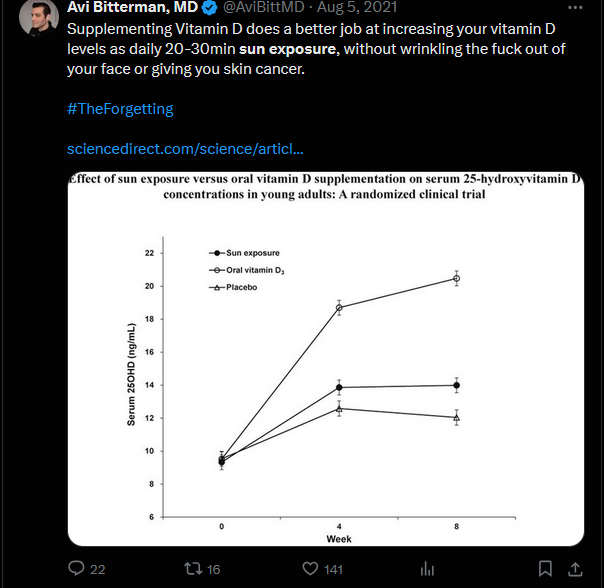
Supplemental Vitamin D > Sun exposure.
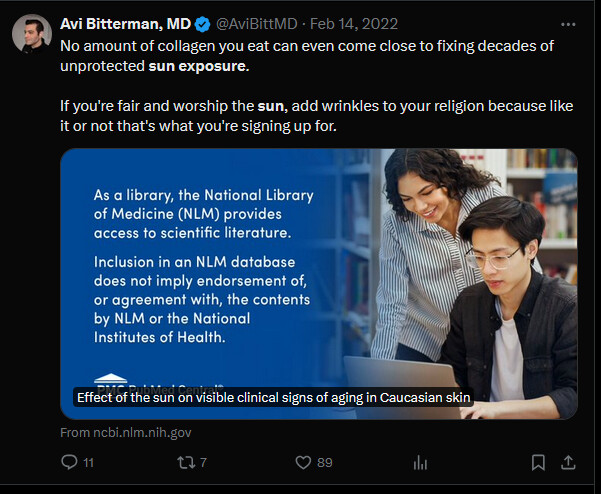
Add wrinkles to your religion, sun worshipers!
Wrinkles improve health!
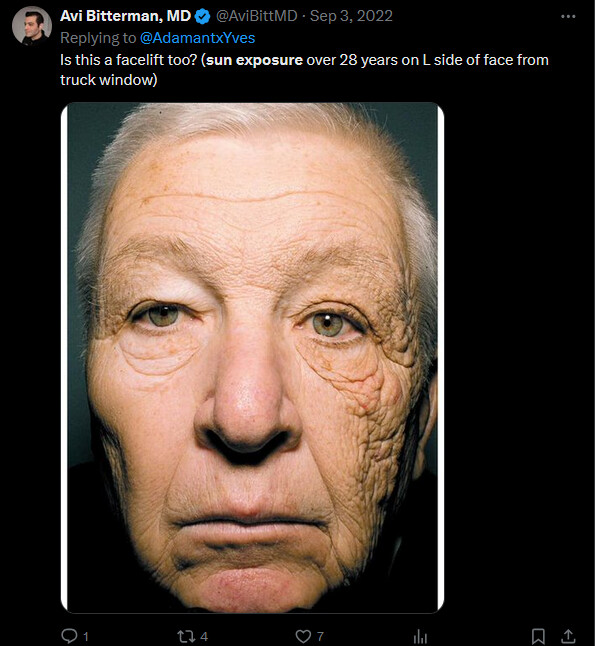

Sunscreen is assosciated with NO increased risk… confounding in sun exposure studies. Adjust for sunscreen use!
5 Likes
AnUser
#45
The people who think they’re protected from the sun with diet…
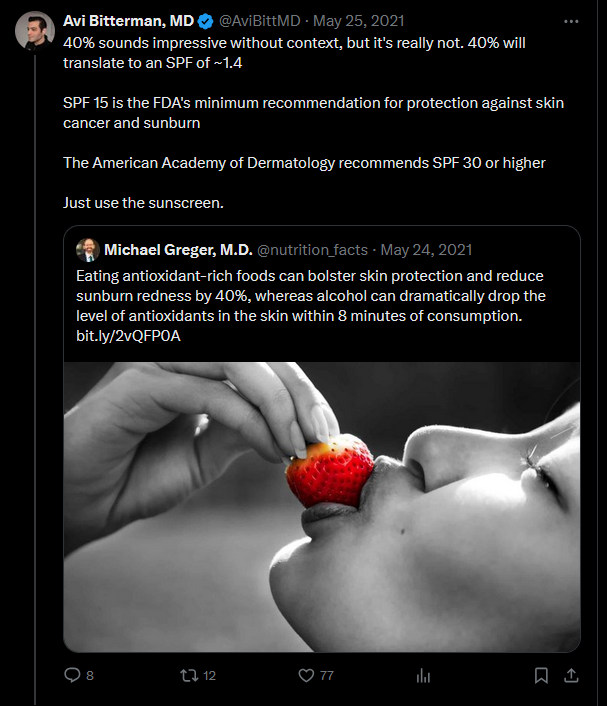
2 Likes
jnorm
#46
Back with more appeals to authority? 
Posting Sinclair’s warning about high levels of sun exposure or burning is disingenuous because nobody here in the sunlight camp is suggesting to do those things. I think the sun is great, but I hardly ever stay in longer than 15 minutes at a time without sunscreen, and I never stay in it long enough to burn.
Also you’re happy to assume that oral supplementation perfectly recapitulates the effects of Vitamin D synthesized in the skin. Got it.
2 Likes
AnUser
#47
They both increase serum vitamin D levels, though the supplement does so more effectively without giving you the wrinkles.
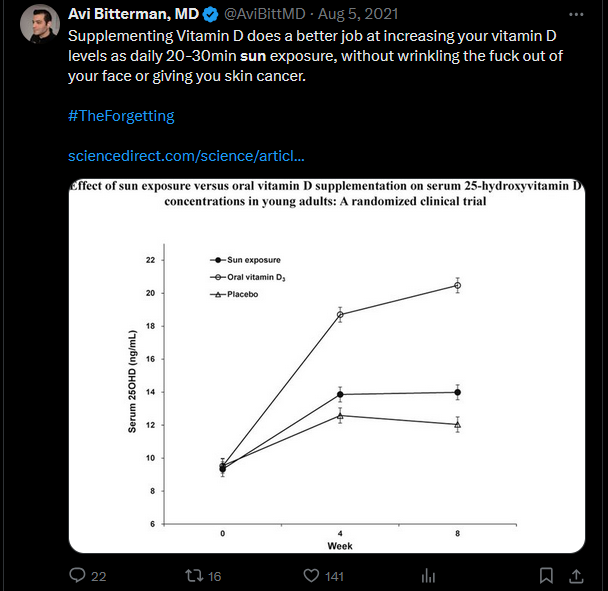
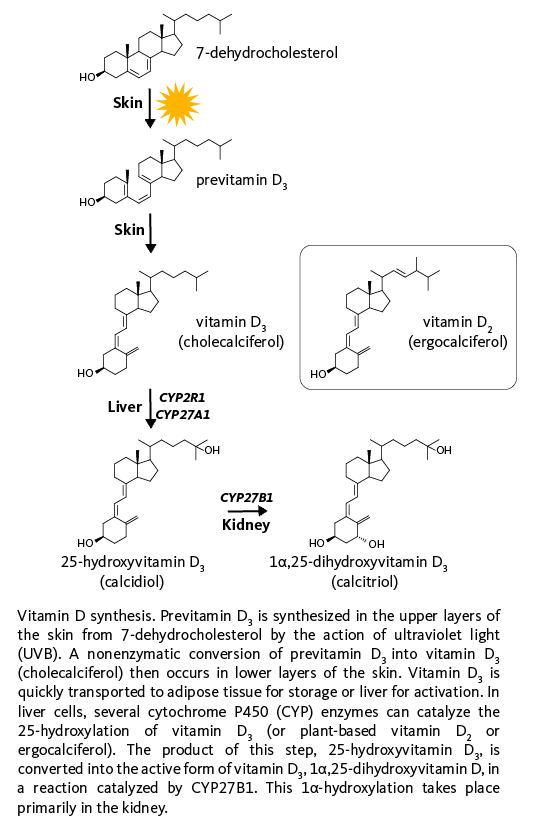
Yes I’m sure the previtamin D3 in your skin is very healthy for you and has a bunch of magical health effects for your skin and body before it is converted to D3. It didn’t help prevent cancer or skin aging, though.
2 Likes
jnorm
#48
We don’t know—that’s the whole point. 99% of the the time you act like the body is a hopelessly complex black box, but when something doesn’t fit your narrative, it must obviously be physiologically insignificant, right?
1 Like
AnUser
#49
So you just confirmed that you have no evidence for your claim.
AnUser
#50
Even a few minutes in the sun can damage your skin, depending on skin type, and for those that don’t, need to be longer in the sun anyway to get vitamin D from the sun.
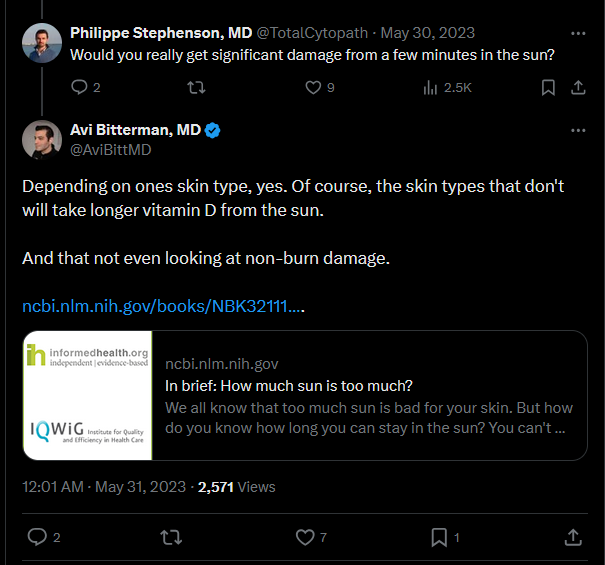
1 Like
jnorm
#51
I think that a reasonable amount of sun exposure is beneficial for your health. In my opinion, you’re the one assuming that vitamin D supplementation can fully compensate for these benefits (e.g the meta-analysis I posted showing no impact on all-cause mortality), and I think your attempt to turn that around on me like some kind of “gotcha moment” is in bad faith.
1 Like
AnUser
#52
Which you have no evidence for that supersedes the evidence for skin aging and skin cancer.
You got me.
The studies you linked showing serum vitamin D levels being assosciated with health status… can not be compensated by vitamin D supplement studies… that increase serum vitamin D levels…
Let’s say it was true that you had a meta-analysis that vitamin D supplementation did not decrease CVD risk, yet sun exposure is associated with decrease CVD risk. That does not mean there is something magical in sun exposure, it is such a low quality study design it can be anything… confounding factors, that has nothing to do with sun exposure. Did that study control for vitamin D levels? That’s the first question you should ask.
LaraPo
#54
This is exactly how I like to sunbathe - be in the shade or covered with light clothes. I still get tanned a little, but don’t have sun damaged skin on face or body.
10 Likes
One of your better points 
1 Like
swsl
#56
Sure wear a hat, use some zinc on your face. Get sunlight on your body. Not too much, not too little. I have long felt that several things have converged in modern society.
- We started to live indoors more and lose our natural relationship to daylight where people were aware when to be out and when to be in the shade.
- We then began to just BINGE on sunshine with Sunday swims, family beach outings and other somewhat isolated over-exposures events with inadequate long term seasonal adaptions. That is, we had no tan but then went out for too long and burned a lot in post WWII society. This is not healthy.
- Partially effective sunscreens were developed and people began to use them as a substitute for common sense and slow seasonal acclimation to the sun. We would and still do go out in mid day depending on the sunscreen to defend us.
- turned out that these sunscreens blocked the painful inflamatory signallng aspect of over-exposure but actually allowed us to inflict more damage as they didn’t block the other aspects that don’t cause pain but can damage. Thus, more skin damage, increased skin cancer. Solution offered: more sunscreen or better yet, avoid all sunshine.
- currently we feel confident that we have a more complete sunscreen formula which further entices some segments to overdo. Thus more cancer reinforcing the extremes of total avoidance (and unclear health consequences) or still failing to acclimate and use common sense.
- The rise of specialists, in this case Dermatologists, means that we get heavy single0-minded messaging for an isolated aspect of health, like skin or cardiac with no consideration of our wholistic health needed. No Dermatologist is going to concern themselves with including the larger equation of human health in relation to the sun. Not their job. Yet we take their advice as if they had the whole picture in mind. A problematic side-effect of specialization to be aware of.
- So, here we are as a society; we have demonized our central life force instead of respecting it and many avoid it, feeling that "vitamin D’ adequately represents the full spectrum of how all previous generations were nourished naturally with sunlight.
- And now, finally, I feel a bit “vindicated” as correlative (if not causal) research and new kinds of opinion leaders are coming forward which (to me rightfully) propose that our reductionism of sunshine to a pill is NOT adequate and we are paying the price in other, more important and urgent dimensions of health while overplaying the reduction of mostly BCC cancers that come with sunlight (OVER exposure?).
Personally I have instinctually been drawn in life to things that society condemns like living barefoot for example. And away from other things that society or the market promotes. Not all, but some notable aspects that never seemed right to me.
For example, it’s interesting to see that after 50 years of mostly shoe-free life, “they” have stopped saying “how can you operate without shoes ! - it’s dirty, you’re gonna get worms!” to “maybe grounding is good, maybe feet are healthier in the original state, maybe we need barefoot simulating sock/shoes” Maybe we need exposure to the Earth. DUH! Such a disconnected society we live in.
And I feel the same about sunlight. I am science minded and have a lot of “faith” in the scientific method but far less in the academic/media promotion and presentation of studies and other isolated advances in our knowledge base. It is clear to me that we misuse or overpromote the method and thus over-isolate, over-reduce and even over-think narrow aspects of things then rush to apply the tidbits of partial (and sometimes outright erroneous understanding as if we now had it all sorted by the most recent research.
Seems clear that a healthy honest instinct is still needed to be a healthy animal.And that depends on mindset and attitude. If you are fearful then your instinct will be to avoid avoid avoid. If you are embracing but with wisdom instinct will say "how does this help and hurt? What is the right engagement?
5 Likes
Do people in naturalistic societies live particularly long lives? The “nature is good” argument assumes that evolution trends towards perfection (by human values) instead of reproduction.
4 Likes
I have found that Mother Nature is just as happy to kill us as she is to nurture us.
She was here long before us and will be here long after us.
She is ambivalent to our insignificant existence.
That tells me that I’m on my own, left to sort out how to live a healthy life. And I’m OK with that 
3 Likes
Significance is given by sapient beings such as ourselves or by celestial beings, should they exist. I, for one, believe my own existence is more significant than that of dead matter.
1 Like
swsl
#60
Have we successfully teased out advances like surgery, dentists and antibiotics to be able to tell?
I can comment that where I live in semi rural Mexico, there are some very healthy old people and they are the ones who come from a fairly wild life, clean food, mostly outdoors though shade, cold water bathing, periodic calorie restriction, varied physical labor. The next generation that worked too hard at the same exact thing over and over, consumed modern processed food and had the money to drink and buy bread are far worse off.
But it’s very difficult to account anecdotally for variables like all those who died young of an infection or whatever, so it’s just my experience and I don’t feel certain about my impression. Just noting a far better health span observed for those who made it past the challenges in those who lived traditionally than most moderns.
So, it’s a question and we can advocate for whichever way we feel makes more sense, nobody has it well-sorted, I think. I fall on the side of ancestral health / lifestyle as ringing true - in general - to our biological form AND I am here on this forum, interested in taking advantage of the better levers, rounder wheels and assorted other technological gains that seem to fit and get us past whatever issues that present here and now. I’m receptive -though with healthy skepticism - to a good hack!
For example, at 65, with acceptable lipid measurements, I asked my doctor for a statin and am taking a very low dose. I have considered this for a while and think it’s a probably good enough (cost/benefit) molecular lever to make use of. I tried Metformin for a while but was scared off by those studies and am seriously watching Rapamycin etc.
It appears quite clear that not all evolutionary developments which worked for reproductive success (in possibly unusual or now different situations) are best for our health span. But I do feel it’s best to start from there and consider the exceptions rather than the other way around.
5 Likes